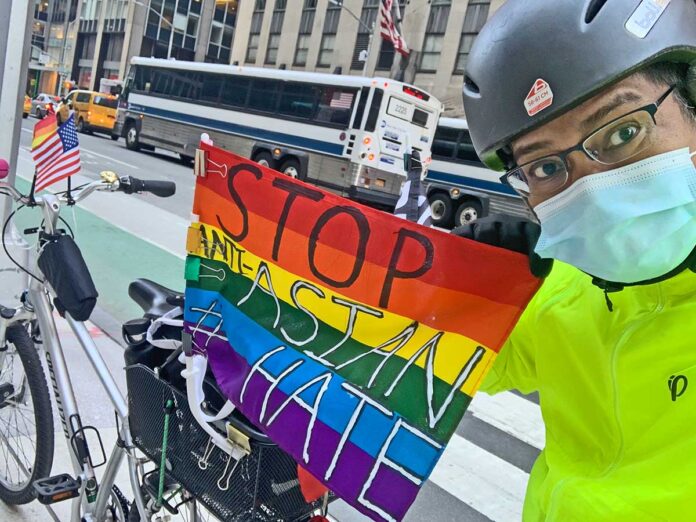Of the more than 4.6 million people who live in Miami-Dade and Broward counties in Florida, less than 120,000 identify as Asian, according to the U.S. Census.
So few Pacific Islanders live in the Miami area, the Census doesn’t register an actual number, just “a value greater than zero.”
And according to the Williams Institute at UCLA School of Law, only 2.8% of AAPI (Asian-American/Pacific Islander) adults identify as LGBT.
“The Asian community in South Florida already is small enough. Now you add LGBTQ on top of that — it feels very, very isolating and it’s hard sometimes to talk about some of the issues we go through,” said Dr. S. Kimberly Liu, a queer Miami acupuncturist and co-founder of NAAAP Pride, a sub-group of the National Association of Asian American Professionals.
The U.S. government recognizes May as Asian/Pacific American Heritage Month. Among the most pressing issues faced today by AAPI people: the well-reported uptick in hate and violence against Asian Americans during the COVID-19 pandemic. The organization Stop AAPI Hate recently reported “2,808 first-hand accounts” of violence in 47 states and the District of Columbia from March 19 and December 30, 2020.
Liu said she could be one of those victims, attacked in her car near Coral Gables at lunchtime last Nov. 3 — Election Day.
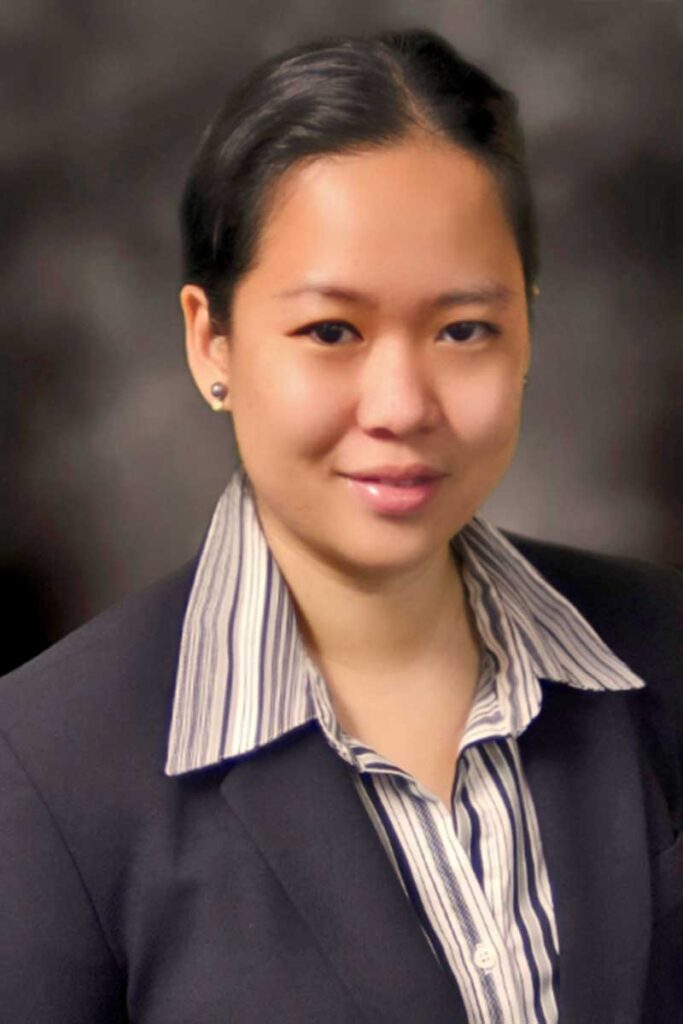
“I was driving home from work around 1, 2 o’clock in the afternoon,” she recalled. “I got blocked off in an intersection by two big trucks with huge Trump/Pence 2020 signs, the flags and whatnot. The people came out and started banging on my window, yelling at me, telling me to go back to China, to take the virus back with me.”
Liu was born 34 years ago in the Dominican Republic and is of Taiwanese-Japanese-African-Russian descent. She has lived in 10 different countries and moved to South Florida in 2008.
“I’ve never been attacked like this in the U.S. I was so shook up,” she said. “I told my boss about it and he got me pepper spray. He was concerned I was being targeted because I was one of the few Asian doctors in the neighborhood.”
Liu, the daughter of diplomats, went to medical school in Taiwan and earned degrees in psychology and pre-med in Hawaii. She finished medical school in the Dominican Republic. In the U.S., she is a “doctor of Oriental medicine.”
In the Dominican Republic, Liu said she had to be cautious about her appearance. “I couldn’t wear too masculine clothes because in Spanish they call it marimacha, ‘tomboy,’ I guess.” (The online Urban Dictionary defines marimacha as “Mexican slang for lesbian/dyke. Considered offensive.”)
“You don’t want to stand out as a tomboy because you will be discriminated against,” Liu said. “People can hit you in the street and throw things at you just because you don’t look feminine enough.”
In 2007, she worked at a Pompano Beach substance abuse clinic.
“I was a counselor. I was verbally attacked for looking Asian,” she said. “One of the clients asked where I was from, if I was Korean, and wanted to know if I would provide sexual massage or whatnot. Completely inappropriate. I was there as a counselor and when I responded, ‘I’m your counselor, this is not what we’re here for’ — very calmly — the person just exploded. Started insulting me, saying I was a whore and I should just go back to Korea, even though I said I’m not from Korea.”
Liu continued: “When I tried to report it to my supervisor, they kind of wrote it off. They said, ‘Well nothing happened, it was just verbal, the guy probably was on drugs, so don’t worry about it.’”
Last year, Liu said, she and her wife were abused in a Miami Beach nightclub.
“My wife is from Venezuela. We were out in a club and we just got harassed,” Liu said. “We were not in a queer or gay club. We got harassed for not wanting to dance with men. And when my wife said I’m here with my wife, some guys just lost it and started yelling at us. Taking pictures. Said we are going to Hell. We had to call security and have those people thrown out.”
Liu continued: “That was a very scary thing to go through, because I have never been yelled at for being queer overseas, even after I was out. But to have that happen here in South Beach, it blows my mind.”
Kenrick Ross, executive director of the National Queer Asian Pacific Islander Alliance (NQAPIA) based in New York, said the recent “surge in anti-Asian violence” began years before COVID-19.
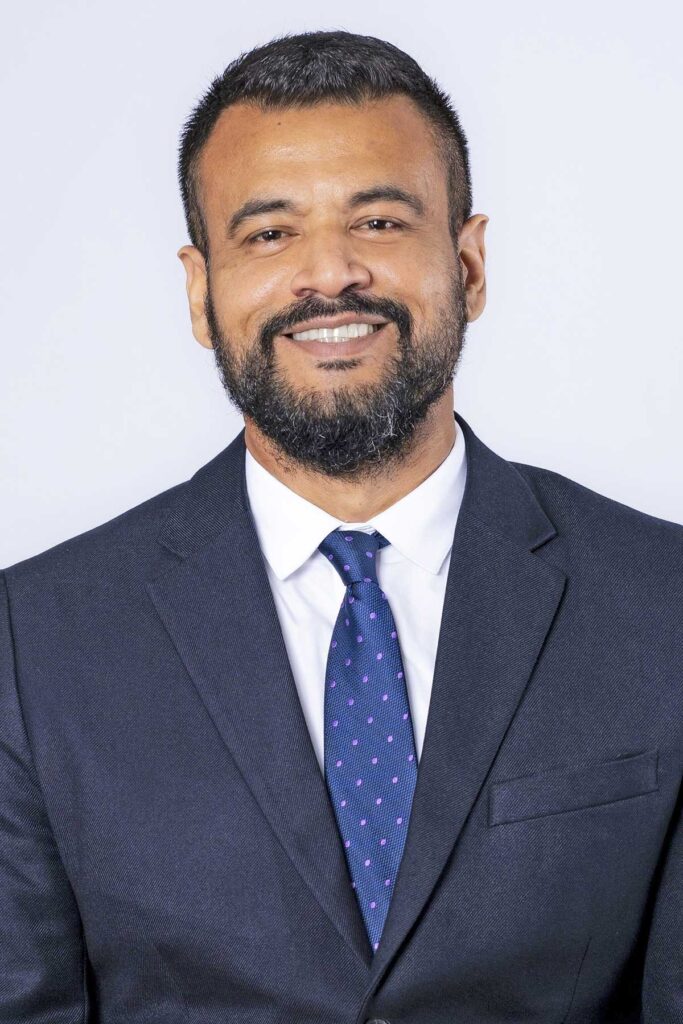
“Four years ago, we saw the violence of the Muslim ban, which impacted many of the communities that NQAPIA serves. Not just from a policy level, but literally we have people in our community that are more cut off from family, from loved ones, because of the ban,” said Ross, who was born in Guyana and raised in the New York City area.
“This continued with the rhetoric. The AAPI community knew this was coming way before the rest of the country really started to see the signs of anti-AAPI violence,” he said. “We had organizations including NQAPIA calling out the fact that this rhetoric was happening 14 months ago, around Wuhan and China, and the more despicable names not just President Trump was using, but many people in his circle were using. That leads to actual instances of violence and hate.”
Ross, whose alliance represents about 60 grassroots organizations, believes “LGBTQ folks of color have borne the heaviest brunt in the pandemic.”
He became NQAPIA director in February, weeks before the March 16 mass shootings in the Atlanta area that left eight people dead, including six Asian women.
“On any given day since the massacre in Atlanta happened, in my position at NQAPIA, I am thinking, I’m talking, strategizing around the surge in anti-Asian violence,” Ross said. “But I’m also thinking about this surge in anti-trans legislation that is like wildfire happening across the country.”
New York-based civil-rights attorney and educator Glenn Magpantay, who co-founded NQAPIA in 2005, said “gay Asians live at the intersection of a dual identity.”
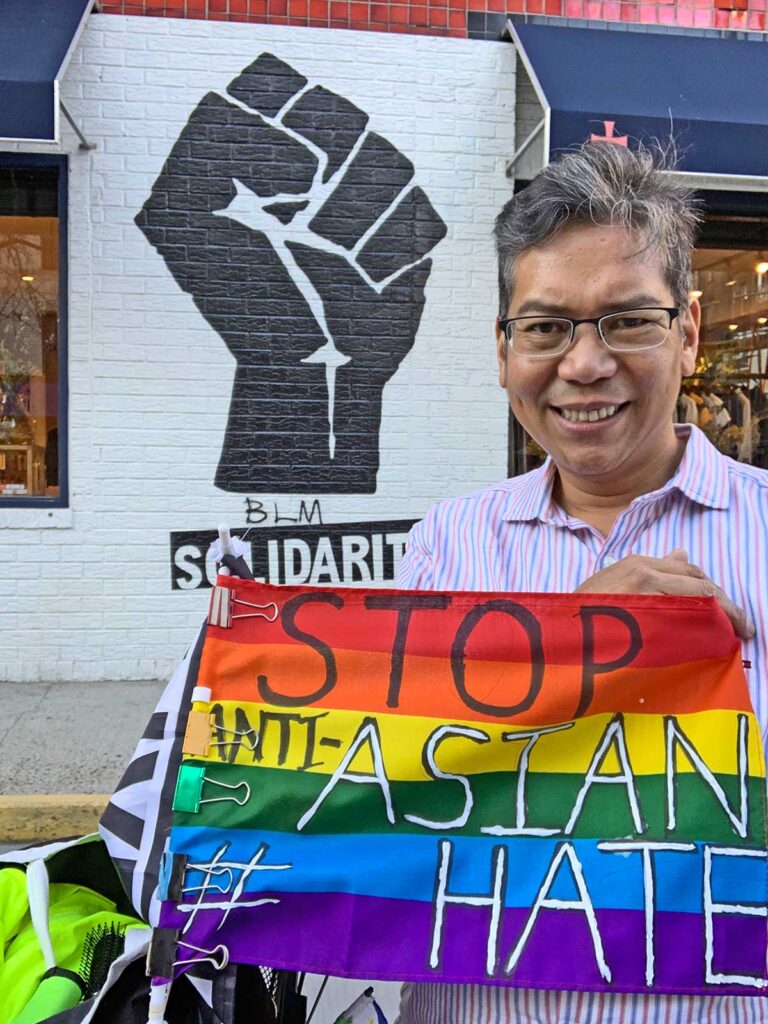
“The haters — the people who are harassing us, people who yell at us for being coronavirus carriers — they don’t discriminate on whether you’re gay Asian, a trans-Asian, a Korean Asian,” said Magpantay, who preceded Ross as NQAPIA executive director. “It doesn’t matter to them. You just look foreign. You look like you have the COVID virus.”
In addition, he said, “Our identities as queer Asians have been flattened by the media. How many of [these hate-crime victims] were gay, queer and trans?”
Even within queer communities, AAPI people are marginalized, he said.
“If you ask me, where do Asian Americans fit in the LGBT community at large, I would say, sadly, at the peripherals,” Magpantay said. “There are very few LGBT organizations who actually are putting out civil-rights issues that affect our community as part of their public policy agenda.”
Immigration reform tops that list. “It’s all about the Equality Act and I agree. We will benefit from the Equality Act, too,” he said. “But so what if you can keep your job but you can still be deported?”
Florida is a glaring example, Magpantay said, of how queer AAPI people are “often overlooked.”
“Most of the Asians in Florida are focused in the South Florida/Miami area and Orlando/Central Florida. And yet there is no viable or existing queer Asian group in Miami. There is one in Orlando that just started and they’re struggling.”
Kyle Maharlika, who was born in North Miami Beach and now lives in Fort Lauderdale, in 2018 launched a group called Miami Queer & Asian. He pulled the plug a year later.
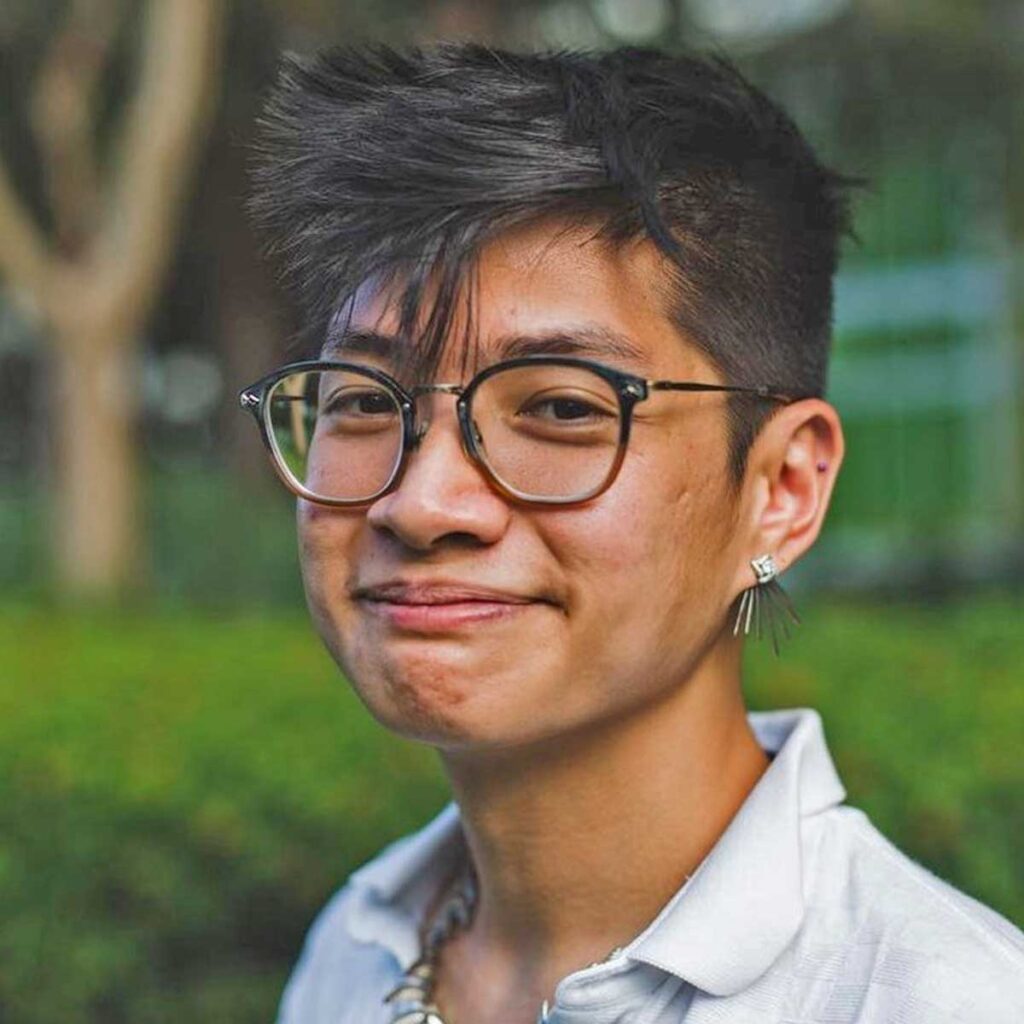
“I disbanded it primarily because I was struggling with building up the community. Not that queer Asian people don’t exist,” said Maharlika, 28, ecosystem manager for a South Florida-based technology and innovation company.
Maharlika said he had reached out to several South Florida LGBT organization leaders hoping to build Miami Q&A membership.
“I just contacted all of them and asked, like, ‘Hey, just share this and if anyone wants to join, have them come.’ So the first meeting, I think it was like six people or something like that,” he said. “I can’t continue to corral people, one by one. I even considered going out into the nightclub scene and trying to find Asian people. The lack of cohesion around the community is part of the difficulty of South Florida.”
In 2017, Maharlika was chosen to be part of Maven Leadership Collective’s inaugural training group. Maven is a South Florida “ideas lab” that “invests in talented queer and trans people of color and allies to build more resilient communities that thrive in transition, crisis, and tragedy,” according to its website.
“I had never been centered as a queer person of color before,” Maharlika recalls. “It was refreshing and eye-opening to have a leadership collective highlight that my possibilities for my life were endless and that my perspective as a queer person of color were actually a gift to offer the world.”
Maharlika and his family are typically South Florida: “My mom is Japanese blood but she’s from Brazil. She’s Japanese Brazilian and she speaks Spanish and Portuguese, not really Japanese. She’s more Latina. And my dad is from the Philippines, and they met in Brazil and then moved to Miami. They immigrated here in the ‘80s.”
Maharlika said being a queer person among other Asians is “kind of weird.”
“There’s a saying in the Asian community: ‘The nail that sticks out gets hammered down,’ so you don’t want to be different.”
Maharlika continued: “Because queerness is seen as different, right? Like you can’t really talk about it with the groups that you’re in. For example, if I’m at Thanksgiving dinner with my sister’s husband’s family. (My sister’s husband is Taiwanese so his whole family is Taiwanese and we’re at his house.) I don’t talk about my relationship. I don’t say, ‘My boyfriend is a Black man, we’re dating and we have the best relationship ever.’ I can’t even say those things and I can’t come out to them because it’s so awkward. You don’t want them to think you’re sticking out or just trying to be different for no reason.”
Maharlika said being Asian in the queer community is “really, really weird.”
“As a gay man, which is my specific experience, I just had a lot of trouble,” he said. “I didn’t have trouble making friends. But you just feel so unattractive because nobody thinks that an Asian man is attractive. Within the gay community, especially with men, I think there’s this idea of like — you’ve heard people say it before — ‘If I wanted to date a girl, I would date a girl.’”
Maharlika said: “I’ve had people say that to me before, that ‘I don’t like effeminate guys’ because Asian-ness in general is associated with femininity. If you’re an Asian man and you’re trying to date, you have some trouble with that. It definitely feels like racism but it’s very unstated. People won’t outright say, for the most part, that they’re not into Asian men. Though some people do and that’s less acceptable now. But they will behave that way.”
Maharlika said his appearance has at times put his safety at risk.
“I’m the type of guy who likes to wear earrings, sometimes I’ll paint my nails. I used to have really, really long hair that went down to my butt. I remember multiple instances where I’d be walking to work. I’d be walking around and someone would say — they think I don’t understand, right, because they think that I’m not Latino — but they would say ‘chino maricon,’ which means Chinese faggot.”
Maharlika continued: “They would say it out loud — actually loudly — because they think that I don’t understand what that means, but I speak Spanish and Portuguese.”
Recently, a man holding a Bible approached Maharlika and, “shoved his finger in my face and asked me why do I have to be such a faggot?”
After the Atlanta shootings, Maharlika said he “just kind of toned it back because I was afraid.”
He began carrying a taser, “tore off” his nail polish and cut his hair.
“One, I just needed a new haircut. But the other reason: It gets pretty tiring to be called a ‘chino maricon.’”
Journalist Steve Rothaus covered LGBT issues for 22 years at the Miami Herald. He writes for the South Florida Gay News, where this article first appeared.
